Alice Through the Looking Glass: A chat with Johnny Depp, Tim Burton, Mia Wasikowska, Sacha Baron Cohen, James Bobin and Suzanne Todd
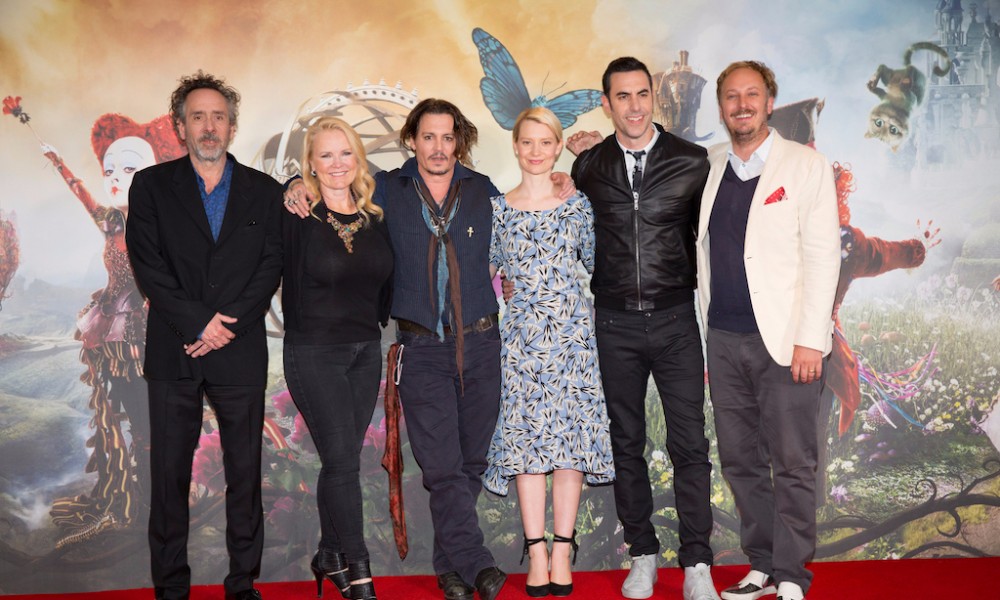
Sequel to Alice in Wonderland, Alice Through the Looking Glass is set to release in cinemas this May. The Upcoming caught up with director James Bobin, producers Tim Burton and Suzanne Todd, and lead actors Johnny Depp, Mia Wasikowska and Sacha Baron Cohen, for a chat about the challenges of making this sequel and their experiences with time.
James, you are intrigued by time, which is a big part of this film – the main theme, if you take away the woman as a strong female character (which you also do very well).
James Bobin: Thank you. I think a very important part of the Alice tradition is that Alice is such a strong character and I think Lewis Caroll wrote her like that. He is very keen that everyone understood that Alice is part of the new generation’s women who were very different from their predecessors and weren’t prepared to stand the status quo any longer. And it happened. Alice’s generation is a generation that grew up to be suffragettes, so they changed the world in many ways. I think Alice was a part of that generation, so that is very important to me.
Sacha, Time is quite a complex character. You never quite know whether he’s a good or a bad guy or whose side he’s on. A lot of his story is not only told through the script but his physicality as well. Did you have fun bringing that to life?
Sacha Baron Cohen: I was very depressed. This guy here [Johnny Depp] was bullying me and I had elastic bands thrown at me, he had his security team hound me, pin me down, I was wedged by a large man – I was overwhelmed. But Time is a complex character. I wanted to wear tights in the movie because I have ladies’ legs and that’s not a gender-specific comment. So it was very important for me to have a tighted character. Also I tried to create this character who was immature, incredibly narcissistic and ill-suited for the most important job in the world – a bit like Donald Trump.
Johnny, you must have enjoyed bringing the wonderful Mad Hatter back to life, but also exploring different characteristics that we didn’t see in the previous film?
Johnny Depp: It was great to come back and explore the story of Alice and the Hatter.
SBC: That’s not what you told me.
JD: I actually did the movie on a dare. Somebody wanted me to run a mile, so I said no and it turned into this thing and we fought. He came in and we made a deal.
But yes, it shows a very different side of the Hatter, beyond the multi-personality. It shows a Hatter that goes near to his lowest point.
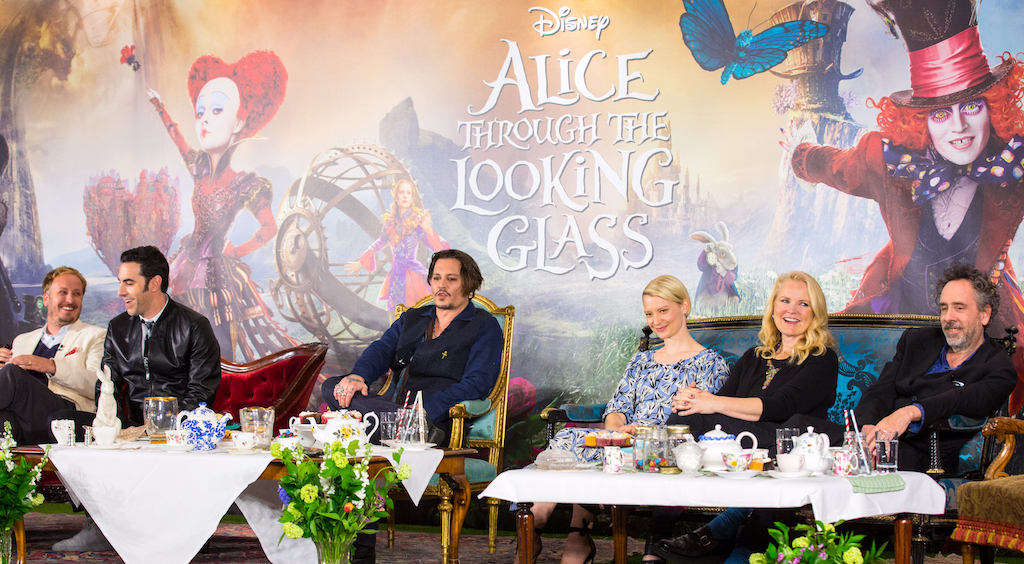 Mia, it’s so important for audiences to make an emotional connection with Alice – and one really does in this film. Was it fun to explore that in her journey?
Mia, it’s so important for audiences to make an emotional connection with Alice – and one really does in this film. Was it fun to explore that in her journey?
Mia Wasikowska: It was great. I think, doing the film again, everyone knew a little bit better what to expect and it was really fun. I think James pushed everybody in an emotional way but also brought his own humour to it, which was really great.
Yes, the the humour and the tone are integral to the film – and Linda’s script is absolutely gorgeous. What was it about Linda’s script that made you think she nailed it?
Suzanne Todd: We took a long time developing the script after the first film came out and this notion or theme of time, which James and Sacha brought so much comedy to. But there is also a lot of emotion to that idea in the film: the preciousness of time and how any of us on any given day do not necessarily spend our time with things that are the most important to us. When you watch the film, you’ll probably take a second thought on how you spend the time in your day.
Tim, you’re here as an executive producer, and you very much agreed with James as the choice for director. Why was he the right man for the job?
Tim Burton: He wanted to do it, but also he had an enthusiasm and a take on it that I felt very positive about. For me, the first film was kind of a fluke, so the fact that he had such a positive and clear idea about it made me think that the sequel needed a different energy and anything I can do to support that.. these are big things, and it needs someone that has energy and focus and the idea to pull it off.
JD: Did you have any problems with green screen after the first one?
TB: I’m still seeing green. In fact, I kicked a few people out for wearing green shirts.
Johnny, considering this is the second time you played the Mad Hatter, what stayed with you? And now you’ve started giving concerts, what’s happening to who you are on stage? Is it the real Johnny Depp or is it a character?
JD: Music was my first love at the age of 12 and I haven’t stopped playing since. It’s still my first love. But there was a certain point when I reached that area of what they call a career, people start to know who you are from one particular field and, having been musician all my life, I knew that it was over. That dream that I had since I was 12 was done, over with. I was fine, I played on people’s or firend’s records and kept a low profile. We had Alice [Cooper] in Dark Shadows and he asked me to jam with him, which was a real honour. We played a few songs and then he asked me to write some songs with him so I wrote about five or six. I came to LA and then suddenly, after thinking I was writing songs for Alice Cooper, suddenly it turned into this Hollywood Vampires thing. In a weird way, that dream that I had left behind became a reality, in a sense, where I didn’t have to do that ridiculous shit where I had to be the frontman. I’m not built for lead singer syndrome. I just get to play the guitar, stand in the dark, and it’s great. It’s like movies have become my day job.
Being back filming with the Hatter was a real treat, because you always feel there’s something more you could do. Thinking: I should have put that there and so on. But coming back, I had the opportunity to do that and give a more interesting performance or take on the Hatter.
Mia, the story of Alice can be very much seen as a rite-of-passage tale. What do you think a modern audience can take from it today and what would you like young girls to learn from the Alice character?
MW: I think it’s great how at the beginning of the film she has been travelling for the past two years and she’s been so empowered and knows who she is and is quite disappointed when she comes back to England and sees how expectations of her are so low. She has this innate sense that she deserves more than that or just to be happy or do what she wants to do. That angle and also the satire of female hysteria, which was taken so seriously not that long ago, shows that we’ve come a long way, but there’s also a long way to go. But it’s wonderful that that will be the first contact for young girls and also boys.
ST: I think there’s something in it too for women in their 20s, in terms of what modern audiences can relate to. Alice is at that point where she knows what she wants to do with her career and she’s very focused on that. But then she also has to deal with her relationships at home and redefine her relationship with her mother, which happens in your 20s. Or trying to figure out your romantic relationships. It’s a turning point for all young women at that age and modern audiences will absolutely be able to relate to Alice’s journey.
JB: Her mum says it best in the film: “Alice can do whatever Alice chooses to do.” For a woman at that time, that’s very unusual. In Victorian England, you had to do what you’re told if you were a girl. Alice teaches her mum in this movie that that’s not the case, which is a nice message that is also important today.
ST: Sadly, there are still people that are trying to tell young girls what to do, so we’re still pushing back on that.
Was it deliberate that “woman” was the last word in the script?
JB: Yes.
Sacha, Time’s accent is fascinating. Is he German, a tribute to German timekeeping perhaps?
SBC: He’s Bavariany – I don’t know. He has that overly pompous, very emphatic way of talking, where everything seems very crucial even though it can be complete nonsense.
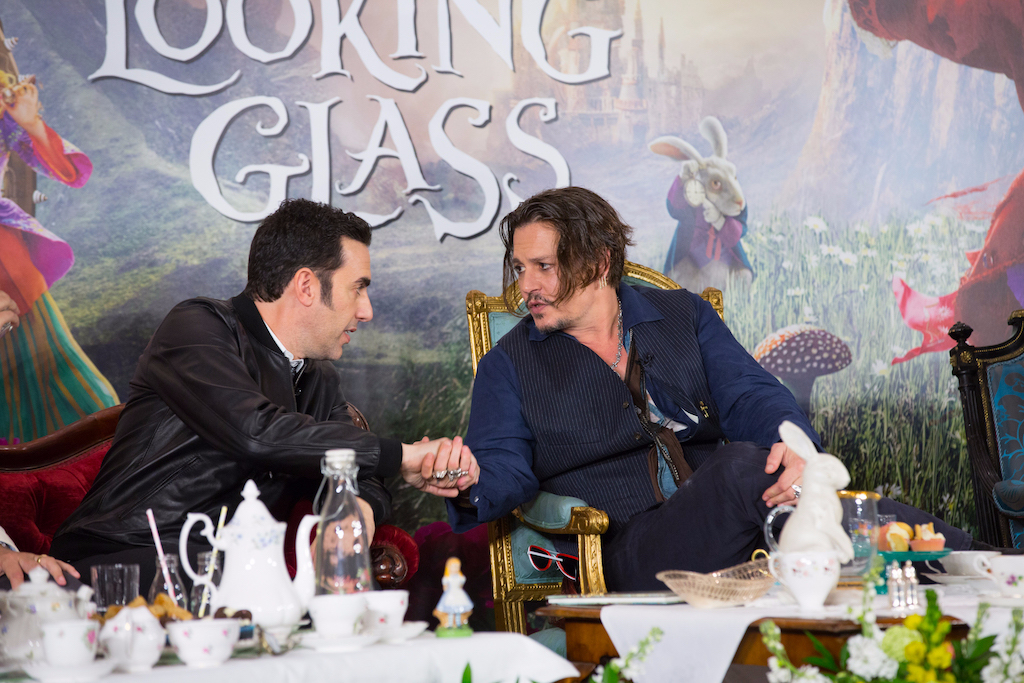
Johnny, we get to see the Hatter as a sweet little boy with a creative flair, then we’re left wanting to know more about him. What can you tell us about how he got mad? Is there ever going to be a prequel or stand-alone Mad Hatter film?
JD: Harvey Weinstein went mad once, Disney made him mad a couple of times. The thing with hatters back in the 19th century was that if they were doing a beaver pelt top hat, the glue they used would be rife with mercury. Hatters going a bit sideways was then a thing. And I figured it was the mercury. But yes, hatters going mad is a true story.
Mia, there are several scientists that believe in time travel or that there are time levels. Are you interested in this idea? Would you like to travel into the past or future and what would you change?
MW: I’m probably alright not traveling in time. It’s not something I really want to do again. I like what the film says about time, that it’s very much about accepting what has happened, freeing you to live more comfortably in the present. If I did travel I would probably do something boring, being one year old and have somebody look after me and be in a pram.
JD: Well I can do that.
MW: Maybe after this.
JD: I’m free.
James and Mia, if you could choose three people dead or alive to invite to the Mad Hatter’s tea party, who would they be and why?
JB: If they were dead they would be no fun, would they? Probably Oscar Wilde, he’s quite a good one; also Charles Dickens, that’d also be good. Quite a high-brow chat. And Charlie Chaplin, my favourite.
MW: I would choose Patti Smith, Mary Shelley and Amy Winehouse.
James and Tim, could you tell us a bit more about how you collaborated as you are returning to this universe that was so distinctively created for the first movie by Tim Burton?
JB: From my point of view, it was from the very outset: we’re going to see Tim in Vancouver to talk about making the movie. He gave me a warning, saying how hard it was. Did I listen? No, I’m still here today. His amazing advice initially was: Don’t shoot on green because it makes you completely crazy, so I didn’t do that and shot on blue. From that day onwards, after he created such a beautiful world in the first film, I felt very much we had to create this one within the parameters of that world, in terms of character and location design and also script. Also, Tim lives in London, so we shot here in London, too, and it was very helpful to have him around. It’s his world, so I was very pleased to be able to draw from his experience.
But it was very important for you to make it your world as well.
JB: Definitely. It is set in a different time period and in different geographical locations, so there was a different feel that I could bring to it, to a degree. But I felt I had to stay within the same universe in terms of characters. Sacha’s character had to fit in with the rest, which is why his silhouette is very striking. For me, it’s like he designed it, because he’s a show-off and therefore he’d want to impress people. That way, it just felt like he fitted very much into this world.
The tea party where Time attends is such a great scene. Was that fully scripted or how was it done?
JB: Some of it. These guys [Johnny Depp and Sacha Baron Cohen] like talking. Especially together. If you ever dive into the depths of the DVD extras, you’ll find moments of the two of them just making the noise “mhm” at each other for about five minutes.
SBC: I think we did an improv take that lasted so long and the studio was so hot, because it’s blue screen and the studio is just filled with light, that the camera melted.
JD: It was probably 30 minutes of James letting Sacha and I just go. When you’re 15 minutes into this improv and you don’t see any way it would stop, peripherally, I just saw crew members walking off to lunch, thinking we probably have to end this soon, but we didn’t, it was fun.
Johnny, you’ve touched a little bit on how you explore different sides of the Mad Hatter character. How was it playing a slightly less mad version this time? There’s a scene where Alice says that she makes no sense compared the you. Was the preparation for the character different from the previous one? Also, do you think in the five or six years since the last film, that time been on your side?
JD: It was really interesting playing the Hatter this time. In the first film, the Mad Hatter is the Mad Hatter – there’s a good deal of licence you can take and interesting places you can travel in the context of the character. But when you’re dealing with the Mad Hatter that has gone noticeably further down the road of insanity, it’s like that problem when you have a mental dilemma and you don’t know about it: it’s great, but when you do know you’re crazy, it’ll eat you alive. I think this Hatter has so many things he has to question and he has to travel in so many different spots. So basically it’s taking the Mad Hatter and making him infinitely more mad, confused, lost, paranoid or even violent, which was a great challenge
JB: When we talked about it initially, it was the idea of “what is madness to a mad person?”. It almost draws towards sanity. You’re wearing a suit, you have smart hair and you’re quite cogent at points.
Johnny, part of the movie is about family and getting family together. If you had the chance to give your six-year-old self advice and maybe change your future, what would you say?
JD: First thing I would say is: search for simplicity. Stay away from everything that makes people stare at you in a restaurant or makes them follow you in cars and motorcycles back to your hotel. Try to avoid people who write incredibly, though sometimes entertaining, but incredibly ludicrous fiction about you and your family. Those would be a couple of things I would say. But I would probably also say that if anybody gives you any shit, just beat the fuck out of them.
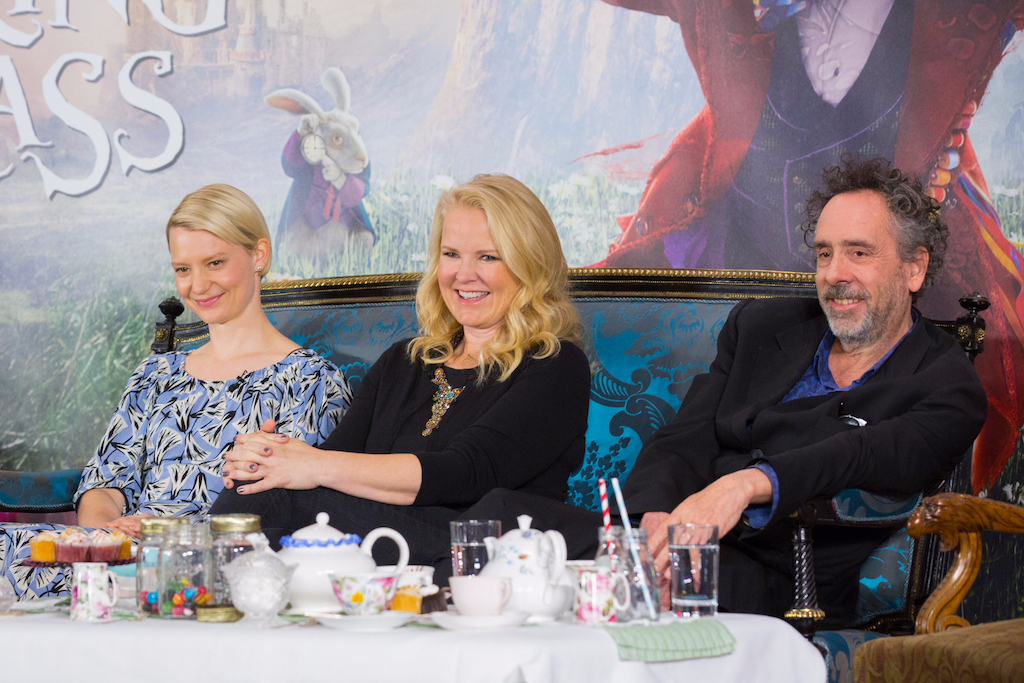
Mia, the film opens with quite an unexpected scene, where we see pirates chasing you. When you opened the script to such an immediate scene with a masculine Alice, what was it like to see her like that?
MW: I thought they had given me Alice of the Caribbean. But it was cool to be given something so active. Alice comes from a place where she is the captain of a ship for two years and feeling incredibly empowered and is doing what she loves. It was really fun. Except for shooting it, which was three days and three nights of being wet.
JB: Mia was blue on set.
ST: Blue lips. She was quite a trooper.
Was it filmed in a tank?
JB: We had these enormous two tanks of water spattering everywhere. It was three in the morning and freezing in November. So Mia was very brave.
You could have made the water warm!
JB: [laughing] Too expensive, forget it.
James and Tim, do you both believe there is an accurate and fair representation of LGBT characters today, to teach the next generation about the ever-changing world we all live in?
JB: I think so. It’s something everyone is very aware of these days when you make anything, because it’s part of the world we live in. When you make a film these days, you can’t help but put that in anyway. People always ask me: “How do you update Lewis Caroll?” And I tell them I just do what I think is interesting and important. So I think it’s one of the things that people are always very aware of.
TB: I hate labelling. I wish we weren’t in a world where women don’t get paid as much as men. It’s stupid. Are there enough gay or lesbian characters? The fact that we have to label shows how bad things really are. I’m not really one for being politically correct and doing this and that. But I do think it is unfortunate that we even have to talk about it. How do you deal with it? I don’t know. But it’s unfortunate. I guess I’m confused too. I don’t know whether I’m gay or straight or half of my friends are or if they’re men or women, so I’m way behind.
JD: I’m gay and I’m a woman. Also I would really like to apologise for not smuggling my dogs into England because it would have been a bad thing to do. The Australians, though chipper…
ST: I feel like Johnny’s dogs were here. Weren’t they with you on set?
TB: I forgot to tell you, they’re dead, I sat on them.
JD: I tried to kill them after Australia…
Luisa Kapp
Photos: James Gillham/Sting Media for Disney
Video: Filippo L’Astorina
Alice Through the Looking Glass is released nationwide on 27th May 2016, check back soon to read our review.

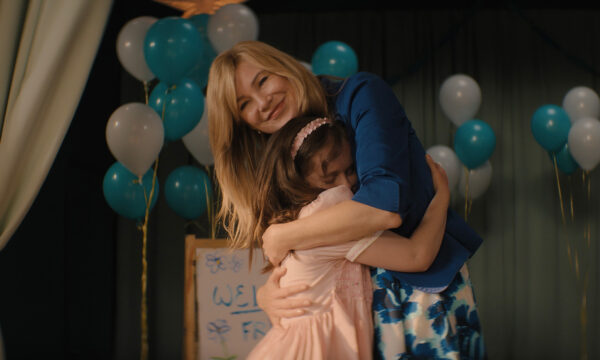
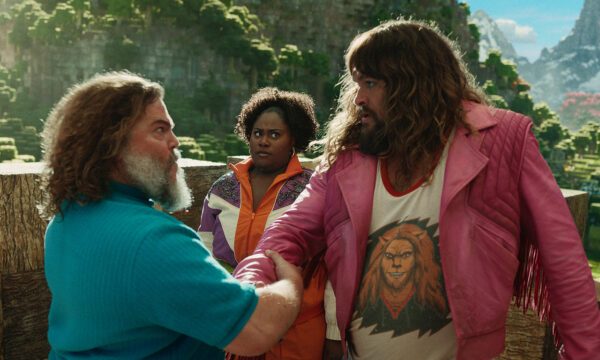
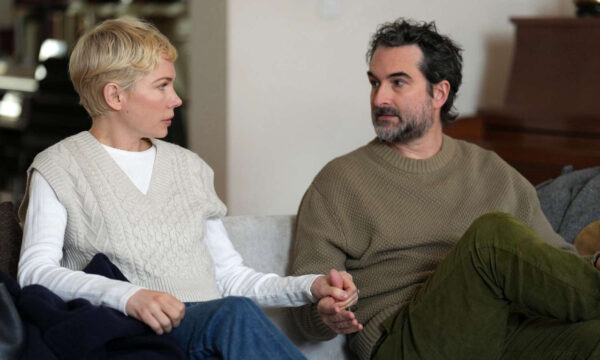
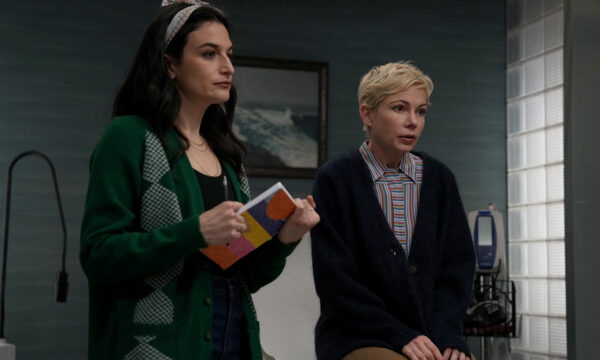


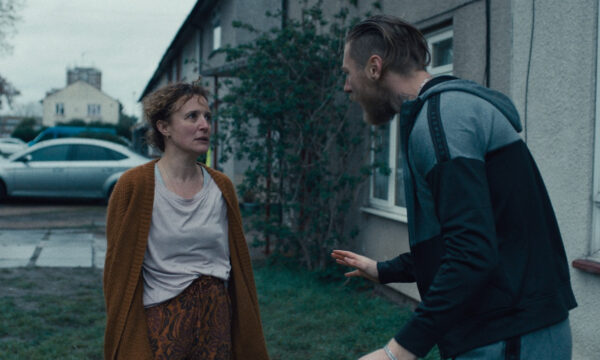











Facebook
Twitter
Instagram
YouTube
RSS